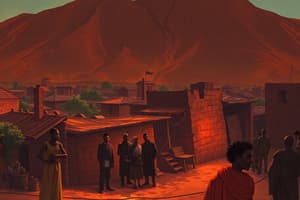Podcast
Questions and Answers
Which system ensures that South African National Assembly seats match the proportion of votes received by each party?
Which system ensures that South African National Assembly seats match the proportion of votes received by each party?
- Majoritarian system
- Mixed-member proportional system
- Proportional Representation system (correct)
- First-past-the-post system
What is a key role of the Independent Electoral Commission (IEC) in South Africa?
What is a key role of the Independent Electoral Commission (IEC) in South Africa?
- Formulating policies for political campaigns
- Distributing government funds to political parties
- Overseeing and managing elections (correct)
- Appointing members of the National Assembly
What was a primary economic effect of apartheid in South Africa?
What was a primary economic effect of apartheid in South Africa?
- Majority of wealth concentrated among whites (correct)
- Equitable distribution of wealth among all racial groups
- Equal economic opportunities for all
- Economic prosperity for non-whites
Which of the following rights were denied to non-whites during apartheid?
Which of the following rights were denied to non-whites during apartheid?
How often are elections held in South Africa according to their constitutional requirements?
How often are elections held in South Africa according to their constitutional requirements?
What is a main challenge in building a unified and inclusive society in South Africa?
What is a main challenge in building a unified and inclusive society in South Africa?
Which of the following groups remains economically disadvantaged in South Africa?
Which of the following groups remains economically disadvantaged in South Africa?
What is a consequence of apartheid's forced removals and land seizures?
What is a consequence of apartheid's forced removals and land seizures?
Who holds a disproportionate amount of wealth and power in South Africa?
Who holds a disproportionate amount of wealth and power in South Africa?
What is a result of apartheid's legacy of racial categorization and segregation?
What is a result of apartheid's legacy of racial categorization and segregation?
Flashcards are hidden until you start studying
Study Notes
Apartheid Legacy
- Racial segregation and discrimination: Apartheid (1948-1994) enforced segregation and discrimination based on race, leading to unequal distribution of power, resources, and opportunities.
- Limited citizenship: Non-whites were denied basic rights, including the right to vote, hold public office, and participate in the democratic process.
- Economic inequality: Apartheid created significant economic disparities, with whites holding the majority of wealth and power.
- Social and political fragmentation: Apartheid's policies of segregation and forced removals led to social and political fragmentation, making it difficult to build a unified national identity.
Electoral Systems
- Proportional Representation (PR) system: South Africa uses a PR system, where political parties are allocated seats in the National Assembly based on the proportion of votes they receive.
- Multi-party system: The country has a multi-party system, with a variety of political parties represented in the National Assembly.
- Voting system: The voting system is based on a national list, where voters cast a single ballot for a party, rather than individual candidates.
- Constitutional requirements: The Electoral Act and the Constitution ensure that the electoral system is free, fair, and transparent, with regular elections held every five years.
- Independent Electoral Commission (IEC): The IEC is an independent body responsible for managing and overseeing elections, ensuring their integrity and credibility.
Apartheid Legacy
- Apartheid enforced racial segregation and discrimination, perpetuating unequal distribution of power, resources, and opportunities from 1948 to 1994.
- Non-whites were denied fundamental rights, including the right to vote, hold public office, and participate in the democratic process.
- Apartheid created significant economic disparities, with whites holding the majority of wealth and power.
- The policies of segregation and forced removals led to social and political fragmentation, making it difficult to build a unified national identity.
Electoral Systems
- South Africa's political system is based on a Proportional Representation (PR) system, where parties are allocated seats in the National Assembly according to the proportion of votes received.
- The country has a multi-party system, with various political parties represented in the National Assembly.
- The voting system relies on a national list, where voters cast a single ballot for a party rather than individual candidates.
- The Electoral Act and the Constitution ensure that the electoral system is free, fair, and transparent, with regular elections held every five years.
- The Independent Electoral Commission (IEC) is an independent body responsible for managing and overseeing elections, ensuring their integrity and credibility.
Apartheid Legacy
Impact on Democracy
- Apartheid's legacy continues to influence South Africa's democracy, with ongoing struggles to address social, economic, and political inequalities.
- Institutionalized racism and segregation have left deep scars, making it challenging to build a unified and inclusive society.
Racial and Socio-Economic Disparities
- Significant disparities in wealth, education, and healthcare exist between different racial groups due to apartheid's legacy of racial segregation and discrimination.
- The majority of the black population remains economically disadvantaged, with limited access to quality education, employment, and healthcare.
- The white population continues to hold a disproportionate amount of wealth and power.
Land Ownership and Redistribution
- Apartheid's forced removals and land seizures have resulted in a significant shortage of land available for black ownership.
- The land reform process, aimed at redistributing land from white to black owners, has been slow and contentious.
Political and Economic Power
- Apartheid's legacy of white minority rule has led to a concentration of political and economic power in the hands of a few, largely white, elites.
- This has resulted in a lack of representation and voice for the black majority, perpetuating social and economic inequalities.
Citizenship and Identity
- Apartheid's legacy of racial categorization and segregation has led to complex and contested notions of citizenship and identity in South Africa.
- Many black South Africans struggle to reconcile their African identity with the legacy of apartheid.
- White South Africans grapple with their role in the country's history and their place in the new democracy.
Reconciliation and Justice
- The Truth and Reconciliation Commission (TRC) was established in 1995 to investigate and address apartheid-era human rights violations.
- The TRC provided a platform for victims to share their stories and perpetrators to seek amnesty, but many argue that it did not go far enough in providing justice and reparations for victims and their families.
Studying That Suits You
Use AI to generate personalized quizzes and flashcards to suit your learning preferences.




